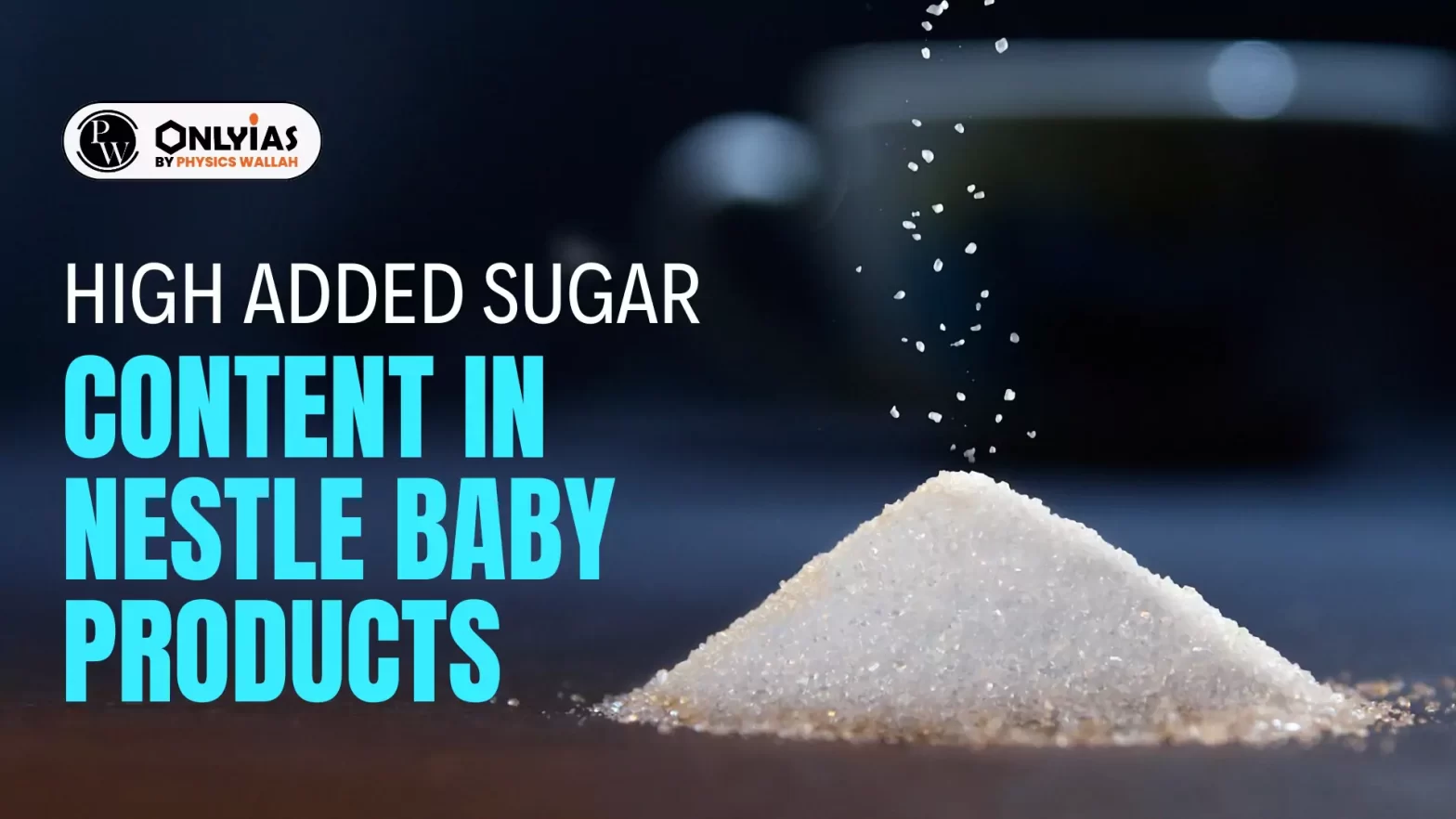Context
According to a report released by Swiss NGO, the Public Eye and International Baby Food Action Network (IBFAN), Nestle’s baby food products sold in India, African and Latin American countries, have higher sugar content, in comparison to the same products sold in European markets.
- Around 150 baby products manufactured by the global food and beverage company, Nestle, sold in different countries were tested in a Belgian laboratory.
Report Reveals High Added Sugar Levels in Baby Foods Across India and Southeast Asia
It was found that all 15 Cerelac products for six-month-old babies, which are sold without any added sugars in the United Kingdom and Germany, contained 2.7 grams of added sugar per serving in India.
- Products sold in Ethiopia and Thailand contained nearly 6 grams of added sugar.
- Among 1,600 infant cereals, snacks and ready-to-eat meals marketed at young children in Southeast Asia, nearly half of the products (44 per cent) included added sugars and sweeteners.
Enroll now for UPSC Online Course
WHO Recommendation:
- WHO recommends that to prevent obesity and chronic diseases, no added sugars or sweetening agents should be permitted in any food for children under three.
- It also called on countries to reduce free sugar intake in children and adults to 10% of their total energy intake
|
Why Are Added Sugars Harmful?
- Naturally Occurring Sugar: Sugar is a simple naturally occurring carbohydrate found in milk (lactose) and fruit (fructose). Any product that contains milk (such as yogurt, milk or cream) or fruit (fresh, dried) contains some natural sugars.
- Free Sugar: Free sugar or added sugar is added separately to a food item during preparation or processing and includes natural sugars such as white sugar, brown sugar and honey, as well as chemically manufactured sweeteners such as high fructose corn syrup.
Risks Due to Added Sugar Intake
- Overweight and Obesity: High consumption of sugar significantly contributes to excess body weight and obesity. It also leads to risk of developing type 2 diabetes, heart disease, and certain cancers.
- Dental Health: High sugar intake is closely linked to dental problems, including cavities. Sugars in food and beverages participate in the tooth decay process by feeding plaque bacteria, which produce acids that erode tooth enamel.
- Chronic Diseases: Consuming too much sugar can increase the risk of developing chronic diseases such as metabolic issues, heart risks, diabetes etc.
- The global burden of Non-Communicable Diseases (NCDs) in India has surged from 38% in 1990 to 65% in 2019, with 1.2 million deaths annually attributed to dietary risks.
- Development of Unhealthy Eating Preferences: Introducing high sugar foods to children can lead to a lifelong preference for overly sweet foods.
- Nutritional Displacement: A diet high in sugary foods often lacks essential nutrients. When people consume too many sugary foods, they tend to consume fewer fruits, vegetables, and whole grains, which provide necessary vitamins, minerals, and fiber.
- Addictive Nature: Sugar can trigger mechanisms similar to those in addiction, leading to compulsive eating behaviors and difficulty controlling the consumption of sweet foods.
- Economic Burden: The economic impact of diseases related to high sugar consumption is substantial.
- In India, the cost associated with overweight and obesity was estimated at $23 billion in 2017, with projections rising to $480 billion by 2060.
- These conditions contribute to increased healthcare expenditures and loss in productivity.
Food Regulation Standards in India
Food regulation standards are majorly governed by the Food Safety and Standards Authority of India (FSSAI). It sets forth comprehensive guidelines and implements the same.
- Regulations for Sugar Content: Indian regulations governing infant nutrition standards do not specify an upper limit for added sugars. Instead, they outline requirements for various macronutrients such as proteins, fats, and carbohydrates, as well as essential micronutrients like Vitamin C, D, Iron, and zinc.
- They also allow sucrose and fructose to be used as carbohydrate sources, provided they constitute less than 20 per cent of the total carbohydrates in the food.
- Food Additives and Contaminants: No food product may contain additives or processing aids that are not approved by the FSSAI. Similarly, food must not contain contaminants or toxic substances beyond specified limits.
- Example: Ban on Rhodamine B, as food coloring agent.
- Pesticides and Residues: Food products must not exceed the set limits for residues such as pesticides, veterinary drugs, antibiotics, and other pharmacological substances.
- The Insecticides Act, 1968 dictates that no insecticides are used directly on food products except for registered fumigants.
- Packaging and Labeling: Labeling must not mislead consumers regarding the food product’s characteristics, origin, or quality. The presentation and information provided must be truthful and informative.
- Advertising Standards: Advertising for food products must not be misleading or deceptive and must comply with the provisions of the Food Safety and Standards Act and its regulations.
- Licensing and Registration: All food vendors and operators need to be registered or licensed under the Food Safety and Standards Act.
- Use of Potable Water: Entities involved in food preparation must ensure their water sources are tested and certified for potability to guarantee that the water used for cooking is safe for consumption.
Enroll now for UPSC Online Classes
Way Forward
- Implementation of High Fat Sugar Salt (HFSS) taxes: There is a need to implement HFSS taxes in India to tackle health risks, emphasizing their role in encouraging healthier choices, driving industry reformulation, and reducing the economic strain on healthcare.
- Alignment with Global Standards: FSSAI needs to align its rules with the global standards such as reduced free sugar requirements in infant food,so that food companies do not discriminate between India and other developed countries.
- Public Awareness and disclosures: There is a need to spread awareness about how to infer mandatory disclosures on packed foods. This would empower them to make informed decisions about their food choices.
Also Read: Taxing HFSS Food As A Public Health Imperative
![]() 23 Apr 2024
23 Apr 2024

